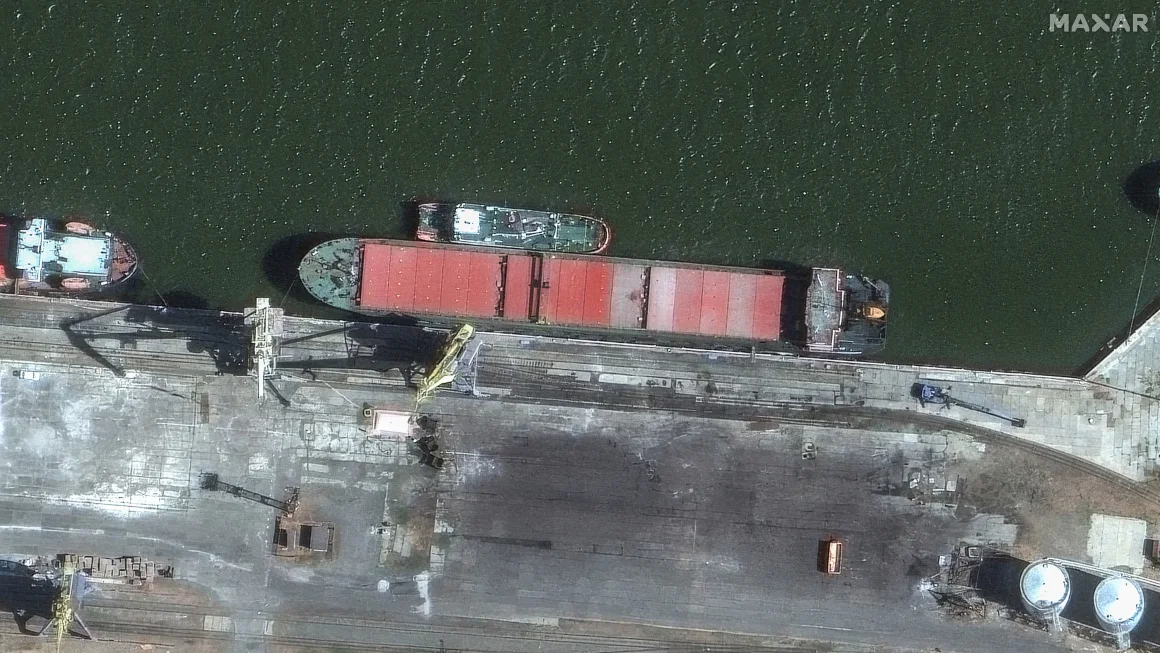A Russian cargo ship, the Port Olya 3, has been suspected of delivering Iranian ballistic missiles to aid Moscow’s efforts in Ukraine. Satellite images reveal the ship’s presence at a Russian port, raising concerns about an escalation in military support from Iran to Russia. As tensions rise, both Ukraine and the international community closely watch the unfolding developments.
The Port Olya 3’s Movement
Satellite imagery from Maxar Technologies identified the Port Olya 3 at the Russian port of Astrakhan on September 4. Prior to this, the vessel had been docked at Iran’s Amirabad port on August 29, sparking speculation about its cargo. The ship’s transponder had been switched off shortly after leaving the Iranian port, obscuring its journey.
According to the U.S. Treasury Department, the Russian Ministry of Defense used the vessel to transport close-range ballistic missiles (CRBMs) from Iran to Russia. “As of early September 2024, Russia received the first shipment of CRBMs from Iran,” the Treasury announced while imposing sanctions on the ship and several Iranian individuals.
Iran’s Support for Russia’s War Efforts
Iran’s support for Russia since the invasion of Ukraine has significantly increased. Iran has supplied Russia with thousands of “Shahed” attack drones and even built a drone factory in Russian territory. Recently, the relationship deepened with reports that Iran had transferred short-range ballistic missiles to Russia, marking a critical escalation. U.S. Secretary of State Antony Blinken confirmed that Iran had supplied Fateh-360 ballistic missiles, which are expected to be used in Ukraine within weeks. These missiles have a range of up to 75 miles and are more challenging to intercept compared to traditional aerial bombs.
Russia’s Strategic Use of Iranian Missiles
The Institute for the Study of War (ISW) predicted that Russian forces would use these Iranian-supplied missiles to target critical Ukrainian infrastructure. “Russian forces will likely use the Iranian-supplied missiles to target Ukrainian energy, military, and civilian infrastructure in the coming months,” ISW stated. These missiles would allow Russia to hit targets from greater distances with greater precision, giving them an advantage in the ongoing conflict.
Iran Denies Supplying Ballistic Missiles
Despite the evidence, Iranian Foreign Minister Seyed Abbas Araghchi denied these claims, stating on X (formerly Twitter), “Iran has NOT delivered ballistic missiles to Russia. Period.” However, Ukrainian officials took the matter seriously, summoning the Iranian charge d’affaires, Shahriar Amouzegar, to warn of “devastating and irreparable consequences” if these reports prove accurate.
A Growing Military Alliance
Since the war began, the military alliance between Iran and Russia has strengthened. Blinken mentioned that dozens of Russian personnel were trained in Iran to operate the Fateh-360 missiles. “Russia is sharing technology that Iran seeks. This is a two-way street, including on nuclear issues, as well as some space information,” Blinken noted. This growing cooperation may have broader implications for international security, especially with potential nuclear and space-related advancements.
The transfer of Iranian ballistic missiles to Russia marks a significant shift in the military dynamics of the Ukraine conflict. As Iran and Russia deepen their military cooperation, questions arise about the international community’s response. Will this escalation prompt the U.S. and its allies to relax restrictions on Ukraine’s use of advanced missiles against Russia? The upcoming meeting between President Joe Biden and UK Prime Minister Keir Starmer may shed light on future strategies in this ongoing geopolitical struggle.







